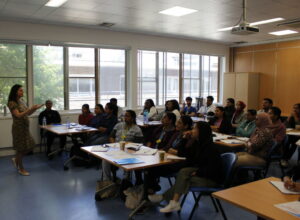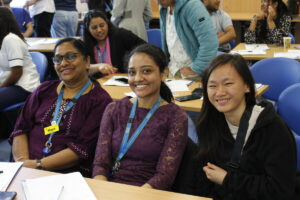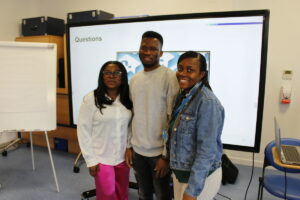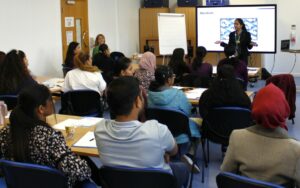By Veronica Jack, Imaging Practice Educator at Bedford Hospital

Attending the Communication workshop for International Nurses and Allied Health Professionals was an enlightening experience. As a Practice Educator, I helped facilitate throughout the day and was deeply impressed by the quality of the content and the staff’s engagement. Despite my 12 years of experience in the NHS, I found myself learning new and valuable insights.
The first talk, delivered by Cate Morgan from NHS England, focused on effective communication skills over the telephone. Cate addressed reluctance to answer the phone due to concerns about not knowing enough about our departments. She emphasised the importance of being prepared to assist the caller and introduced a helpful SBAR tool to enhance our ability to respond effectively. Cate’s tips were directly applicable, especially for our international colleagues who face additional challenges in language barriers and accents. Her insights were crucial in helping them overcome these obstacles and improve their telephone communication skills.
 Cate’s presentation on having courageous conversations was another highlight. She provided tools and strategies for addressing difficult topics, emphasizing that staff do not need to suffer in silence. This topic is particularly relevant for fostering a supportive work environment where all staff feel empowered to speak up.
Cate’s presentation on having courageous conversations was another highlight. She provided tools and strategies for addressing difficult topics, emphasizing that staff do not need to suffer in silence. This topic is particularly relevant for fostering a supportive work environment where all staff feel empowered to speak up.
Equality, Diversity, and Inclusion
The highlight of the day was the Equality, Diversity, and Inclusion (EDI) talk, focusing on racism in the NHS and the ongoing efforts to combat it. This session addressed not only racism but other forms of discrimination like colourism and xenophobia, illustrating that discrimination can take many forms. The discussion highlighted that while race is often the primary focus, it’s important to recognise and address our own biases and prejudices. The presenter did a great job of navigating these complex issues as these topics can be triggering for many.

The environment provided a safe space for people to share their experiences. During this talk, participants were asked if they had faced any discrimination in the workplace, and many shared that they had. It was emphasised that discrimination in any form is unacceptable and the NHS is committed to creating an inclusive environment. The EDI initiatives within the NHS aim to foster a culture of equality where all forms of discrimination are actively challenged and where staff are encouraged to have courageous conversations about their experiences and observations of discrimination.
Cultural learning
In the afternoon, we participated in workshops featuring various scenarios. These included discussions on cultural differences, giving instructions to patients with specific needs, and communicating with other health professionals. The mixed group discussions and role-playing exercises demonstrated the excellent interpersonal skills of our international staff. It was heartening to see their confidence and comfort in participating actively.

Another significant part of the workshop was understanding the nuances of British culture, particularly in terms of what topics are considered acceptable or taboo in conversation. This discussion was crucial for international staff to help them navigate social interactions more smoothly. For example, while topics like the weather and general pleasantries are commonly discussed and safe, topics such as personal finances, political views, and intimate personal details are often avoided in casual conversations. Understanding these cultural nuances helps international staff integrate better into the workplace, ensuring that they communicate in ways that are considered polite and appropriate within the British context.
In conclusion, I highly recommend these workshops to all relevant staff. To managers and Practice Educators, please make time for your staff to attend. They are a fantastic resource for our international staff, equipping them with essential communication skills and fostering a more inclusive and supportive work environment.

